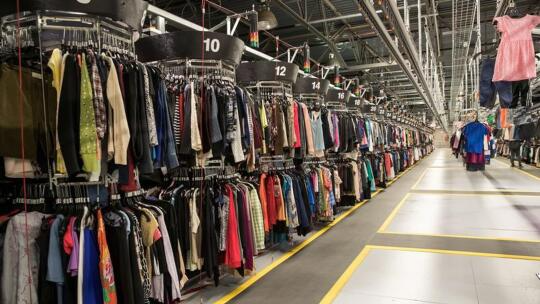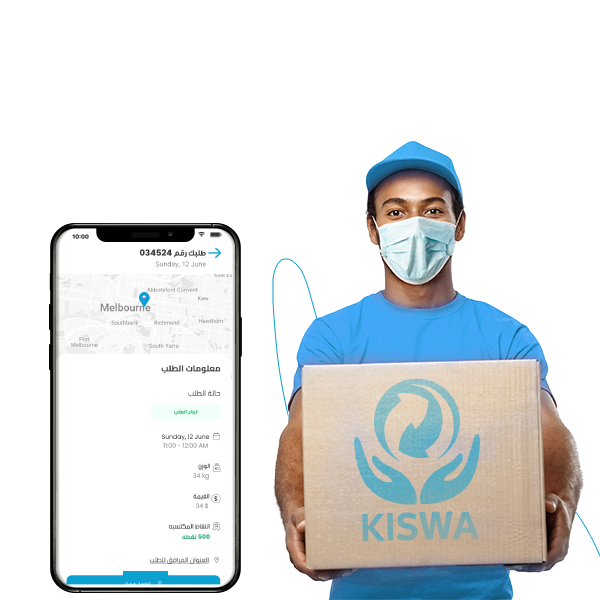Kiswa's vital role in preserving sustainability and community awareness
Every year, immense quantities of extra clothing accumulate in our closets, some forgotten deep within and others worn only for a few times. However, behind this seemingly minor extra lies a significant environmental challenge... Every unworn item adds a new burden to our land, water, and natural resources.
This is Kiswa's vital role in preserving sustainability and community awareness. Kiswa sees extra clothing not as a wasted opportunity but as the beginning of a genuine sustainable impact. By granting these items a new lease on life, you directly contribute to environmental protection, transforming your participation into difference-making action.
This leads us to an important question: What are the initial steps toward achieving a sustainable impact?
Perhaps the first step is closer than you imagine ... right inside your own closet. In this article, we will examine how a simple act like contributing or recycling clothes can create a multiplied effect on the environment and society. Together, we will explore how Kiswa helps transform this concept into a tangible reality, highlighting collaborative sustainability and inspiring us all to be part of this positive change.
The environmental impact of clothing accumulation:
The accumulation of unused clothing and textiles is growing, posing a significant environmental problem that demands our attention. When these immense quantities of clothes reach landfills, they transform into a source of pollution. Today, the majority of textiles are made from materials like polyester, which require hundreds of years to fully decompose. With rising consumption, numerous reports have monitored the environmental risks of both production processes and those resulting from old clothing waste in the absence of recycling. Furthermore, in the case of natural fabrics, the accompanying harm during decomposition is the release of harmful methane gas, contributing to global warming.
The degradation of clothing over time harms the environment in various ways: it consumes large areas of land and leads to water contamination due to chemical substances. This is where the Environmental Impact of Clothing Accumulation' becomes clear. Every piece of neglected, unused clothing is essentially a waste of energy and water. Therefore, the solution lies in transforming clothing extra into effective contributions; an effort that is more than just a good deed, it is a necessary step to preserve a clean environment and ensure a better future for our children.
The Role of Institutions and Initiatives in Fostering Environmental and Social Awareness:
Solving the environmental pollution crisis does not rely on individuals only; it requires participation from various entities, both governmental and private. Initiatives carried out with Kiswa play a major role in spreading environmental and community awareness and transforming public interest in the environment into effective actions. At Kiswa, we organize specialized initiatives to collect extra clothing from the employees of institutions and corporations. This collaborative effort makes it easy for employees to participate and ensures that the disposal of extra or unfitted garments is safe and environment-friendly.
Among our impactful initiatives are those conducted with companies like "Xerox" , "DHL" , and "Aramco". Through these partnerships, we help institutions fulfill their responsibility toward the community and the environment, transforming the concept of conscious consumption into an impactful step that positively affects the environment.
Corporations often possess a large environmental imprint, and by adopting responsible practices, they can contribute to preserving biodiversity, biodiversity being the term used to describe the variety of life on Earth, which ensures safe living environments. Since this shared environmental responsibility starts with making conscious daily decisions, it is essential to understand the options available to us. So, what is the core difference between disposing of clothes and recycling them, and how does each choice impact our resources?
The Difference Between Disposing of Clothes and Recycling Them:
When it comes to extra clothing, everyone faces two choices, each with a totally different impact on the environment.
The First Choice: Traditional disposal of clothes by throwing them away, which ultimately sends them to landfills. This action only increases the negative environmental imprint. Fabrics require a long time to decompose, and during this period, they release harmful gases that pollute the atmosphere and consume natural resources.
The Second Choice: Conscious recycling. This process is not mere disposal; it is the reclamation of resource value. Through recycling with "Kiswa," extra clothing is collected to mitigate the risk of textile waste and foster greater sustainability for a better future
From Your Closet to a Green Future: How to Start Your Journey Towards Sustainability?
Real change sometimes begins with the seemingly insignificant details we overlook, such as a piece of clothing we no longer wear or a closet overflowing with more than we need. What many people fail to realize is that every unused item represents a new environmental burden on the planet, and the journey toward sustainability can start with a small step inside our homes.
Studies indicate that the clothing industry generates almost 92 million tons of waste per year globally.This massive number shows the vast amount of waste that could be avoided if even a small portion of this quantity were recycled or reused. Recycling clothes not only conserves natural resources but also reduces carbon emissions and contributes to mitigating soil and water pollution.
This is where a vital role for us as individuals emerges to make a real difference through simple yet impactful steps:
Sort Unused Clothes: Identify the items you haven't worn for many months, and be honest with yourself about what you truly need.
Extra Clothes Condition: Determine what is still fit for contribution, and what is too damaged can be recycled and granted a new life.
Connect with Trusted Organizations: Such as Kiswa, which ensures the recycling of every item in a responsible manner that simultaneously preserves the environment and serves the community.
Turn Contribution into a Habit: Allocate periodic time to organize your wardrobe and contribute to your extra, so that a simple act becomes a sustainable behavior.
With these small steps, every individual has an important and vital role in building a more conscious and sustainable future. Every piece of clothing returned to the lifecycle carries a real impact to protect the environment.
How Contribution Revives the Values of Cooperation and Social Responsibility:
Community contribution is not merely an action offered to others; it is a force that reminds us of the idea of human solidarity. Every small contribution you make carries a huge impact: it strengthens the bonds between individuals and makes everyone feel the importance of their role in society. When you share your time and effort, you don't just provide environmental awareness; you build bridges of trust and cooperation, instilling the values of respect and responsibility with every step you take, both for yourself and your family.
Supporting your contribution transforms responsible action into a daily habit, fostering a sense of belonging and reinforcing a culture of cooperation among various social groups so that participation becomes a natural part of our lives.
Furthermore, community contributions help make society more united and humane, where the feeling of individualism disappears, replaced by a sense of shared participation and collective responsibility.
Eventually, contribution benefits everyone: it improves the health of the environment, grants the contributor a feeling of connection and purpose, and builds a community capable of sustaining cooperation and contribution sustainably.
Conclusion:
"Our journey toward sustainability requires us all to recognize that the environmental impact of clothing accumulation is a challenge we can overcome through conscious and deliberate action. Initiatives and institutions, obviously led by Kiswa, have proven their vital role as a bridge connecting individual contribution to a real impact on the environment and society.
While clothing disposal represents a heavy burden, resulting in wasted resources and increased pollution, recycling creates a positive impact on the sustainability of our resources and revives the values of cooperation and solidarity. The zero waste solution for your clothing is not merely about disposal; it is about active participation in building a better, greener future.
Therefore, you must look at the surplus clothes in your closet with a different perspective toward a green future. Today, you own the decision to start your sustainability journey with one simple, impactful step.





_20240325114503000ItBbKdoZu7.webp)
_20240325115249000UirOdThkkG.webp)
_20240325115505000Ykx8WHs73s.webp)
_20240325115934000UukQIBaw2h.webp)
_20240325120255000zpwtHKUqlm.webp)
